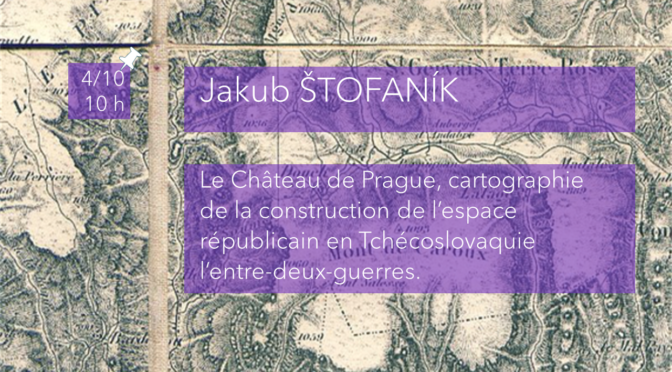
The Prague Castle: Cartography of the Construction of Republican Space in Czechoslovakia Between the Two Wars
First session of the 2024-2025 CEFRES Francophone Interdisciplinary Seminar The Map and the Border
Already in 2023, we started questionning the very act of bordering and representing (a territory, a period, a trajectory). In short, thanks to the interdisciplinarity of our respective disciplines, we began inquiring into the question of the map and the border.
Location: CEFRES, Na Florenci 3, Prague 1
Date: Friday 4th, October 2024, from 10am to 12pm
Language: French
Speaker: Jakub Štofaník (The Masaryk Institute and the Archives of the Czech Academy of Sciences)
Discussant: (Eliška Tomalová (Faculty of Social Sciences, Charles University)
Abstract Continue reading The Prague Castle Between the Two Wars →
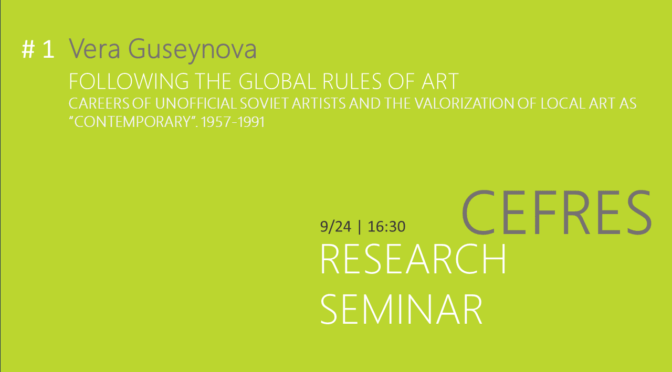
Following the Global Rules of Art?
Careers of Unofficial Soviet Artists and the Valorization of Local Art as a “Contemporary”.
1957–1991
1st session of CEFRES in-house seminar
Through the presentation of works in progress, CEFRES’s Seminar aims at raising and discussing issues about methods, approaches or concepts, in a multidisciplinary spirit, allowing everyone to confront her or his own perspectives with the research presented.
Location: CEFRES Library
Date: Tuesday, 24 Septembre, 2024 at 4:30 p.m.
Language: English
Contact / To register: cefres[@]cefres.cz
Chair: Fedra PARKMANN (Institute of Art History, Czech Academy of Sciences / associated at CEFRES)
Abstract
Continue reading Following the Global Rules of Art? →
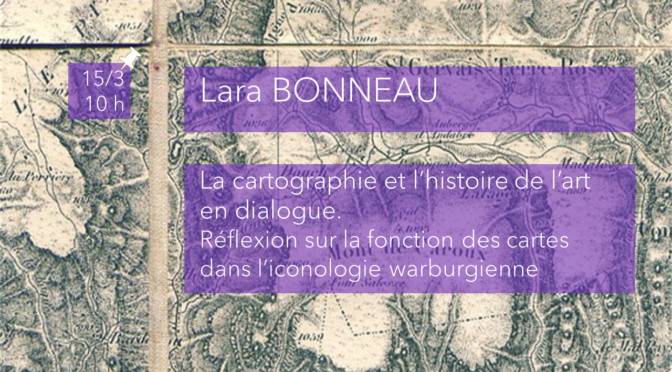
Cartography and art history in dialogue. Reflections on the functions of maps in Warburgian iconology
Seventh session of the 2023-2024 CEFRES Francophone Interdisciplinary Seminar The map and the border
In 2023, we would like to start by beginning by questionning the very act of bordering and representing (a territory, a period, a trajectory), in short, thanks to the interdisciplinarity of our respective disciplines, to question the map and the border.
Location: CEFRES Library, Na Florenci 3, Prague 1
Dates: Friday, June 14th, 10 – 11.30 am
Language: French
Speaker : Lara BONNEAU, Institute of Philosophy of Czech Academy of Sciences (FLÚ – AV ČR), associate researcher at CEFRES
Discussant : Danièle COHN, Université Paris 1
Has the tendency towards ornamentation in the graphic gesture been an obstacle to the scientific development of cartography? In other words, has cartography had to liberate itself from the artistic dimension, which is too imbued with a sensitive end emotional life, to become a planimetric abstraction? These were central questions for the German art historian Aby Warburg, who saw the cartographic gesture as one of the ways of distancing oneself psychologically from the senses. By giving contours to what is presented as moving, changing, even chaotic in perceptual experience, by assigning it a place within an order (kosmos), and by presenting it in space rather than in time, mapping has a psychological function: it gives the subject points which help him to anchor himself and distance himself from reality. Nevertheless, as the demon-populated astrological natal charts demonstrate, cartography cannot totally abolish the dimensions of fear and desire of our relationship with the world and the universe. Maps have a sensitive “cosmetic” dimension, which is perhaps not directly opposed to the ambition to bring cosmic order. In order to study how these demons moved historically, providing lasting fertile ground for the iconographic tradition as much as for scientific attempts to conquer the space of thought, Aby Warburg was led to draw… maps. Maps of the migratory routes of motifs and styles, of the “formules of pathos” from Athens to Babylon, from Babylon to Southern and the Northern Europe. Drawing in particular on the recent work od Phillipe Despoix (2023), we shall try to present the function of cartography in Warburgian iconology.
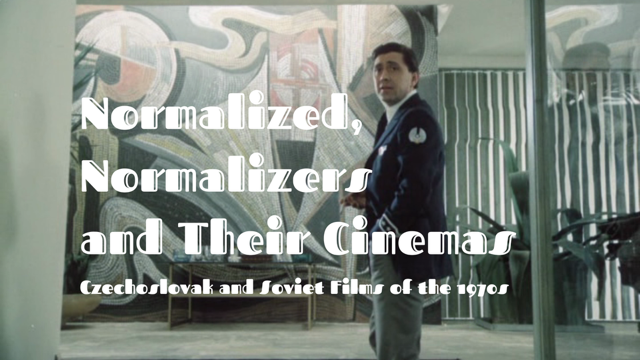
The normalized, the normalizers and their cinemas: Czechoslovak and Soviet Films of the 1970s
Created and moderated by Anastasia Mamaeva, PhD student at UMR Eur’ORBEM (Sorbonne University/CNRS, Paris), this webinar is organized with the support of Eur’ORBEM, CEFRES (Prague) and Charles University (Prague).
Location: CEFRES, Na Florenci 3, Prague 1 and online (to get the link, please register at cefres@cefres.cz)
Date: May 13, May 27, June 4, 2024 at 4:30 pm (CET)
Language: English
Program
Every session will take place from 4.30 to 6 PM Prague/Paris time and will include a presentation and a discussion.
Monday, May 13
The Squalid Charms of the Stagnation Cinematic Aesthetics
Igor GULIN (independent cultural historian, critic, poet)
Monday, May 27
Visitors and Insiders: The Normalisation-Era Career of Jindřich Polák
Jonathan OWEN (independent scholar of Eastern and Central European cinema, avant-gardes, and cult film; author, Avant-Garde to New Wave: Czechoslovak Cinema, Surrealism and the Sixties, 2011)
Tuesday, June 4
Czechoslovak public relations films for export
Lucie ČESÁLKOVÁ (editor-in-chief, Iluminace magazine; Charles University, Prague)
Abstract
Continue reading The normalized, the normalizers and their cinemas →

The normalized, the normalizers and their cinemas: Czechoslovak and Soviet Films of the 1970s
Created and moderated by Anastasia Mamaeva, PhD student at UMR Eur’ORBEM (Sorbonne University/CNRS, Paris), this webinar is organized with the support of Eur’ORBEM, CEFRES (Prague) and Charles University (Prague).
Location: CEFRES, Na Florenci 3, Prague 1 and online (to get the link, please register at cefres@cefres.cz)
Date: May 13, May 27, June 4, 2024 at 4:30 pm (CET)
Language: English
Program
Every session will take place from 4.30 to 6 PM Prague/Paris time and will include a presentation and a discussion.
Monday, May 13
The Squalid Charms of the Stagnation Cinematic Aesthetics
Igor GULIN (independent cultural historian, critic, poet)
Monday, May 27
Visitors and Insiders: The Normalisation-Era Career of Jindřich Polák
Jonathan OWEN (independent scholar of Eastern and Central European cinema, avant-gardes, and cult film; author, Avant-Garde to New Wave: Czechoslovak Cinema, Surrealism and the Sixties, 2011)
Tuesday, June 4
Czechoslovak public relations films for export
Lucie ČESÁLKOVÁ (editor-in-chief, Iluminace magazine; Charles University, Prague)
Abstract
Continue reading The normalized, the normalizers and their cinemas →
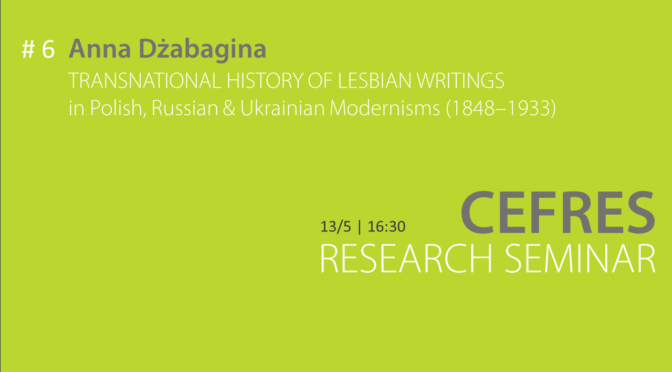
Sapphic Empire: Transnational History of Lesbian Writings in Polish, Russian and Ukrainian Modernisms and beyond (1848–1933)
6th session of CEFRES in-house seminar
Through the presentation of works in progress, CEFRES’s Seminar aims at raising and discussing issues about methods, approaches or concepts, in a multidisciplinary spirit, allowing everyone to confront her or his own perspectives with the research presented.
Location: CEFRES Library
Date: Tuesday, May 13, 2024 at 4:30 pm
Language: English
Contact / To register: cefres[@]cefres.cz
Speaker: Anna Dżabagina (CEFRES / Charles University)
Chair: Libuše Heczková, FF UK Continue reading Sapphic Empire →





